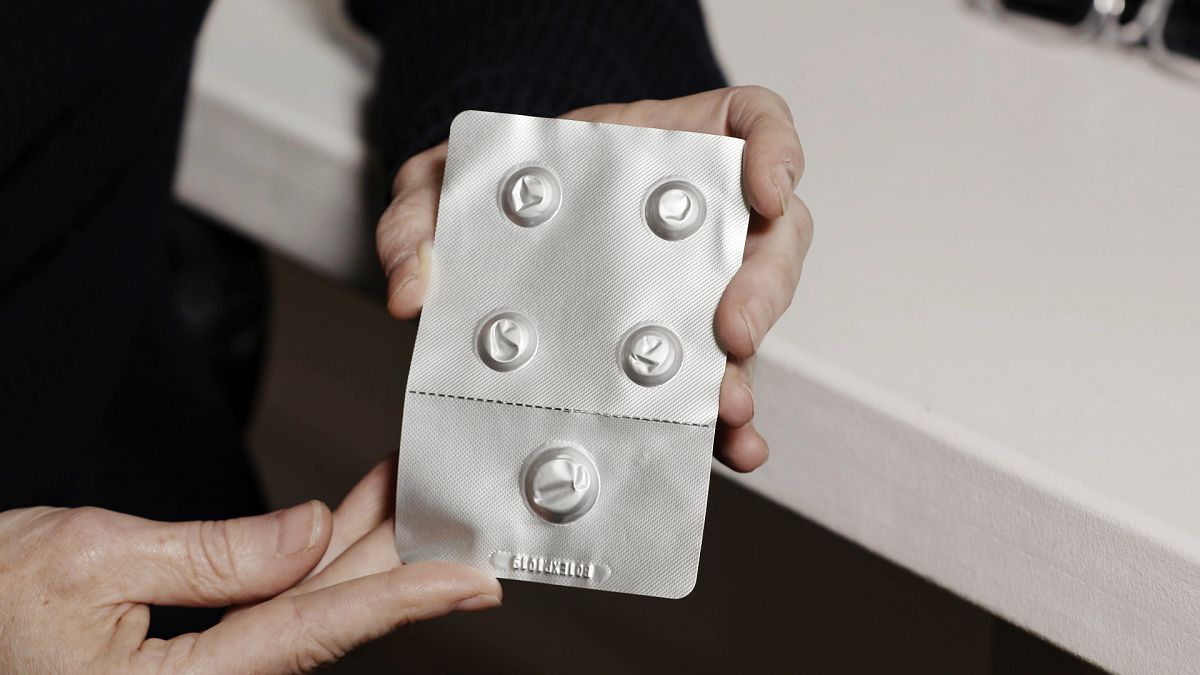Aid Access, an organization started by a Dutch doctor to offer abortion pills to women in the U.S., is defying an FDA warning by continuing to operate.
Necolie remembers taking the pregnancy test in the bathroom and then throwing it at her husband. "I'm not doing this again," she said.
By then, in late 2018, her husband had been out of work for three months. Necolie, who lives on the Florida Coast and asked that her full name not be used to protect her privacy, was borrowing gas money from friends so she could drive her three kids to school. During her last pregnancy, she had developed a serious liver condition and had to be hospitalized.
Necolie loved being a mother but knew that she wanted, and maybe needed, to end the pregnancy. "It was really difficult to get to that point, especially as someone who has been a Republican voter. … I was Catholic. I just didn't believe in that for anyone, much less myself."
Necolie found a clinic in Tallahassee, about three hours away, that would accept her health insurance, but she needed to pay $600 up front for the abortion and then submit the receipt to her insurance company for reimbursement. "There was no money to go there and do that," she said. Necolie sat down at her computer and started researching ways to give herself an abortion at home.
On abortion-themed message boards and subreddits, she learned about pharmacies abroad that sold abortion pills: The medications mifepristone and misoprostol which, since 2000, have been available in the United States as an alternative to surgical abortion for women who are less than 10 weeks pregnant. Inside the U.S., such abortion pills are approved but heavily regulated by the Food and Drug Administration and can be dispensed only by health care professionals who agree to stock the medication and sign a waiver guaranteeing emergency care for women who need it.
But online, dozens of websites offer the pills for less than $100 to more than $500. Some make dubious claims about "pain-free" and "100 percent working" abortions.
As states including Alabama,Mississippi, Ohio and Georgia pass bills restricting abortion access, and as abortion remains an unaffordable option for many women like Necolie, experts expect that more American women may turn to these websites for alternatives.
"As abortion access at clinics becomes more and more constrained, I would anticipate that more people will look for options, including online options," said Dr Daniel Grossman, a professor of obstetrics, gynaecology and reproductive sciences at the University of California, San Francisco.
But by selling unregulated abortion pills, these websites are breaking U.S. law, according to the FDA, which last year reportedly raided the home of a New York City woman who was mailing out abortion pills. The FDA declined to comment.
Another fight is unfolding between the FDA and Aid Access, an organisation that was started in April 2018 by a Dutch doctor, based in Europe — and whose website Necolie found as she searched online for abortion pills. The group's physicians prescribe abortion medication for $95 — or free, in cases of financial need — and then send the prescriptions to a pharmacy in India, which mails them to the U.S. Aid Access is different from many other online abortion pill providers in that it is managed by a physician, Dr Rebecca Gomperts.
On March 8, the FDA sent Gomperts a warning letter, notifying the organisation that it was violating U.S. law and ordering it to "immediately cease" its sale of "misbranded and unapproved new drugs." The letter notes that the specific brand of mifepristone and misoprostol being sent to Aid Access patients has not been FDA approved. The FDA's approval process involves inspection of a manufacturing facility and testing of its products.
Gomperts told NBC News that she would not comply with the FDA warning: "I will not cease to help women that need my help." She also disputed the claim that she was selling medication since she sends her prescriptions to an independent pharmacy. In a letter to the FDA, Gomperts' lawyer argued that because abortion is restricted in the U.S., "women have been forced to attempt to exercise their right to a medical abortion by way of the internet."
An abortion option
Gomperts made a name for herself in the 1990s, when she startedperforming abortions on a boat, in international waters, for women who lived in countries where abortion was illegal, such as Ireland. In 2006, when abortion medication was more widely available, she started Women on Web, a "telemedicine support service" that prescribes mifepristone and misoprostol.
At first, it did not occur to Gomperts that women in the U.S. would need her services, since abortion is legal across the country. But she said she soon started getting pleading letters from American women, asking for help in terminating their pregnancies, so she started Aid Access to serve Americans directly.
In its first year, Aid Access received approximately 21,000 requests for abortion medication, according to Abigail Aiken, an assistant professor of public affairs at the University of Texas at Austin who has analyzed the Aid Access data. The requests came from every state and the District of Columbia. In 2018, 2,581 women received prescriptions from Aid Access for abortion medication, according to a statement from Gomperts' attorney.
At her office in Amsterdam, Gomperts told NBC News that most of her patients come to her because they cannot afford abortions where they live. Others say they are coping with domestic violence and are unable to get to a clinic safely. The median cost of an abortion, at 10 weeks or less, is about $500, according to the Guttmacher Institute, a think tank that supports abortion rights. In many states, Medicaid and some insurance companies are only allowed to cover abortion if the patient's life is in danger or the pregnancy results from rape or incest.
There is not extensive data on how many American women "self-induce" abortions, Grossman said. One of his studies, published in the journal Contraception, found that up to 7 percent of abortion patients in Texas had tried to end their pregnancy before going to a clinic. A national survey from 2014 found that about 2 percent of abortion patients had tried to self-induce at some point in their lives. A 2018 paper concluded that many choose to self-manage abortion because of "clinic access barriers," although some preferred the "convenience, privacy and familiarity of one's own home."
Women who order abortion pills online do so at some risk. It is illegal to order prescription medication online, although an FDA spokesperson confirmed that the agency "generally does not take enforcement action against individuals who purchase medicines online for their own personal use." The FDA also notes that prescription medications purchased online are not FDA-regulated, and so could be contaminated or counterfeit.
The legality of self-induced abortion itself is complicated and varies by state. Since 2000, at least 21 people across the U.S. have been arrested or imprisoned for allegedly ending a pregnancy or helping someone they know to end a pregnancy, said Jill E. Adams, a lawyer and the executive director of If/When/How, an organization focused on reproductive justice.
Six states have laws against self-managed abortion. (Idaho's law was declared unconstitutional by the 9th Circuit Court in 2015, but is still on the books.) Thirty-eight states have fetal-homicide laws. In other states, Adams said, prosecutors have used a patchwork of antiquated criminal laws, some from the 1800s, to charge women with crimes like "concealment of a birth," "improper disposal of fetal remains" or "unlawful practice of medicine."
Some health care providers worry that women who self-induce abortion put themselves at risk, in part because they don't have a physician overseeing their care: verifying how far along they are in a pregnancy and screening for risk factors, like an ectopic pregnancy. Serious complications from medication abortion occur in about 0.3 percent of cases.
Aid Access advises patients that abortions from medication and miscarriages look the same, so if a patient needs to go to the hospital because of complications, "you can tell the doctors you think you had a miscarriage."
Gomperts said she is not aware of any deaths or serious complications among her patients.
'I was afraid to go to my doctor'
Necolie, the Florida mother of three, found Aid Access and completed its online survey, which asked about her medical history and her proximity to emergency medical care. She paid the required $95 by wire transfer, then waited for the pills to arrive. She wasn't sure if what she had done was legal. "I just kind of automatically assumed that they were operating in a grey area," she said.
When she received the medication, she induced the abortion by taking the mifepristone pill and then, 24 hours later, taking four misoprostol pills.
"Literally, will it kill me?" she said she wondered. "Is this legit medication? Is this the real deal?" Necolie took hot showers to help with the pain. Her husband microwaved bags of rice for her to rest on her cramping stomach.
The next day, Necolie thought about going to a doctor to get checked out, because of the amount of blood she was losing, but she decided against it, and the bleeding stopped.
"Since I had obtained the medication in a kind of grey area sort of way, I was afraid to go to my doctor," she said. "I should have been able to go to a doctor."




